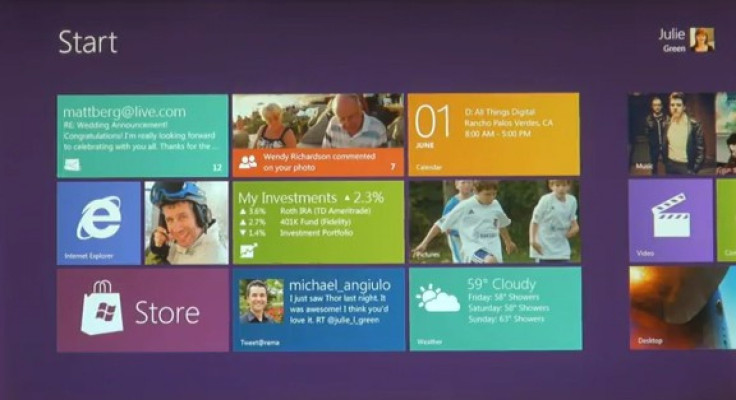IDC Prediction: Windows 8 Launch Largely Irrelevant But Why Not? (Analysis + Video)

In an IDC report on 'Top 10 system software prediction for 2012', the potential success of Windows 8 was given a poor evaluation by the global market research company.
IDC pointed out that Windows 8 launch will be largely irrelevant for PC users and it might not capture the potential market, citing two reasons.
One is that Windows 8 is not familiar to existing Windows users. Secondly, Windows 8 has entered into the tablet PC market so late.
Let us check out their analysis in detail.
An IDC analyst says, “Windows 8 will be largely irrelevant to the users of traditional PCs, and we expect effectively no upgrade activity from Windows 7 to Windows 8 in that form factor.”
We wonder whether Windows 8 is so bad to get this bitter criticism? However, the unfamiliar interface of Windows 8 makes us nod in a way. Windows 8 is an operating system (OS) which consists of a mosaic of tiles in its home screen. Each of these tiles are dedicated to an application (or app) or program. This 'mosaic of tiles' interface, called 'Metro,' was already introduced by Windows Phone 7. But this is the first time for Metro interface to be applied in an OS that can be used on desktop PC.
Here lies the problem. Not only PC users are not familiar with Metro interface, but also Metro interface itself was specifically developed for mobile devices like tablet PC or smartphone.
Windows 8 also supports 'Desktop Mode' i.e. if anybody is unfamiliar with the Metro interface, he/she can change Windows 8 to look like the classic desktop Windows interface. But IDC has criticized that this 'Desktop Mode' is quite similar to what Windows 7 has. So Windows 7 users would feel it's not worthwhile upgrading to Windows 8.
IDC foresees that many enterprise users would also be a stumbling block. It is because Windows 8 looks very unfamiliar to a company's traditional work environment. In other words, additional education to accustom corporate users to Windows 8's Metro interface will be necessary. It can be time consuming as well as expensive. For this reason, many companies may shun Windows 8.
But it is not that Windows 8 only supports desktop PC environment. One of the most important features of Windows 8 is the Metro interface that is suitable for tablet PC environment. So wouldn't this factor help Windows 8 taste success in the tablet PC market?
However, IDC casts doubt, saying that Microsoft (MS) was too late in jumping into the tablet PC market, which is already dominated by Apple's mobile OS - iOS - and Google's Android OS. Thanks to the iPad, Apple iOS has dominated over 70% of tablet PC market share by 2011. The remaining market share is controlled by Google Android OS, QNX of Research in Motion (BlackBerry maker), web OS by HP, etc. So, IDC suggests that there is nothing left on the table for MS to grab. On top of this, the cut-throat competition among existing players to lower the price barrier would give MS additional pressure.
But Intel CEO Paul Otellini has a different take on the Windows 8 issue.
We are very excited about Windows 8. I think it’s one of the best things that’s ever happened to our Company. And it’s a very good operating system, not just for PCs, but we think also will allow tablets to really get a legitimacy into mainstream computing, particularly in enterprises that they don’t have today. A lot of the enterprise managers are worried about security, they’re worried about the difficulty affording their legacy applications over to an Android tablet or to an iPad, Otellini said at a Credit Suisse technology conference earlier this year.
What Microsoft is doing is making that seamless for them. And they have a new experience, which they call Metro, that’s the interface up there. But for Intel-based machines, there is also one button that basically takes you back to your classic Windows experience and that’s a software button essentially, he said.
According to the Intel CEO, Windows 8 is the right platform that connects between the tablet PC environment and the existing desktop PC environment as the user can easily move back and forth from the Metro interface and the classic Windows interface. Windows 8 also allows users to run programs that are compatible with the existing Windows OS.
And, with the line between desktop PC and tablet PC blurring everyday, Windows 8 is the perfect platform to help users make the transition as the operating system responds well to gestures and touch (for tablet PC) as well as to the traditional mouse and keyboard (for desktop PC). He also pointed out that though people are getting used to tablet PC, it does not mean that desktop PC market is on the decline. Rather, the desktop PC market is evolving especially in the developing countries with large populations like China, Brazil and India. In these countries, the demand for desktop PC is still increasing.
The prediction of IDC is just a prediction for now. It might be interesting to see whether MS would prove their forecast and expectation wrong by making Windows 8 a blockbuster as Otellini suggests. After all, it is up to how the customer responds.
Microsoft Windows 8 beta version is expected to be released in February 2012. A new app store for it will also be launched around the same time.
Check out the preview of Windows 8 in the video below:
© Copyright IBTimes 2024. All rights reserved.











